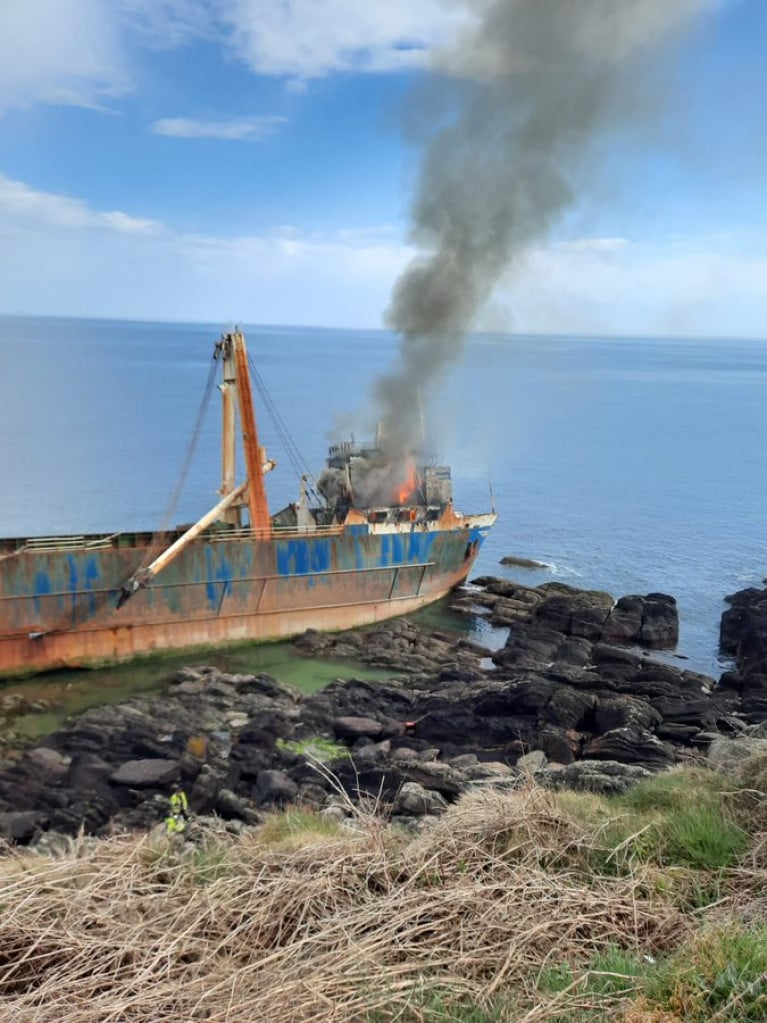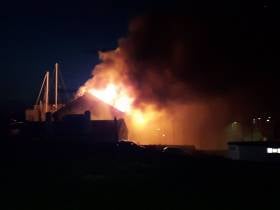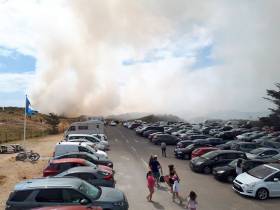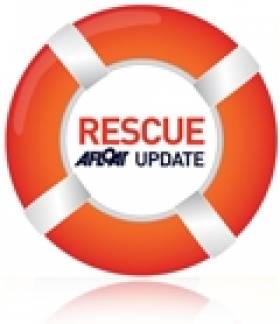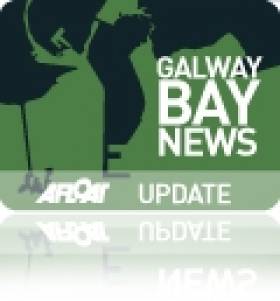Displaying items by tag: Fire
A North Channel ferry operated by Stena Line caught fire when berthed in Belfast Harbour yesterday, 19 July.
The Stena Superfast VII which was berthed at Victoria Terminal 4 (VT4) is where emergency crews from the Northern Ireland Fire and Rescue service were scrambled in the morning to the quayside on the West Bank Road.
According to the ferry operator, a small fire had broken out on a backup generator on the Stena Superfast VII. During the incident there were no passengers on board the ferry that operates the Belfast-Cairnryan route.
As ITV News reported, it is thought the fire will cause delays to the day’s sailings (which Afloat adds led to cancelled sailings instead, see further update below).
“Stena Line can confirm that a small fire broke out in an emergency generator room onboard the Stena Superfast VII vessel this morning (July 19th) as it prepared to sail for the 11.30hrs crossing from Belfast Harbour to Cairnryan," a spokesperson said.
"The fire was quickly extinguished by Stena Line crew, emergency services were alerted as a precaution. There were no passengers onboard the ship at the time and there were no injuries.
“The 11.30hrs sailing was cancelled and Stena Line is currently working on a revised sailing schedule for the remainder of the day and will advise all affected passengers accordingly.”
Afloat adds that Stena Line today, Thursday, 20 July, have a temporary replacement ferry in place as the Stena Nordica has taken over the sailing roster of Stena Superfast VII which went for repairs to the nearby Harland & Wolff shipyard.
The Stena Nordica yesterday evening was taken off service on the Rosslare-Fishguard as Afloat tracked the ropax less than a hour after departing the Wexford ferryport at 20.00. The 450 passenger ferry with 1,700 freight vehicle lane-metre capacity, made an overnight repositioning passage to Belfast Harbour to where it was redeployed on the route to Scotland.
As of this morning, Stena Nordica which is a more freight orientated ferry (ropax) made a first sailing this morning bound for Cairnryan. The routine scheduled 07.30 sailing instead took place slightly later with a departure of 08.00hrs. The return sailing from Cairnryan is scheduled for 11.30 with an arrival back in Belfast at 13.45.
According to the Stena Line freight website, the Stena Superfast VII is to remain out of service until next Sunday, 23 July.
In the meantime, the North Channel ferry's twin, Stena Superfast VIII will maintain sailings on the route along with the Stena Nordica on the busy N.Ireland-Scotland short sea link.
It is less than a week ago when the Stena Nordica had only been introduced on the Rosslare-Fishguard route to replace the veteran Stena Europe as the new permanent ferry on the Ireland-Wales route.
Passengers on the St. Georges Channel route have been advised of alternative travel arrangements which have been made with Irish Ferries on their Rosslare-Pembroke Dock route.
Fire On Board Stena Line Rosslare-Fishguard Ferry Prompts Big Response
A fire broke which broke out on a Stena Line ferry travelling from Wexford to Pembrokeshire had led to the scrambling of emergency services.
Life jackets were worn by passengers on board the Stena Europe which was sailing from Rosslare to Fishguard on Saturday night.
The crew of the 1,400 passenger ferry which has been on the Ireland-Wales route since 2002, were able to extinguish a blaze which took place in the engine room said HM Coastguard.
The ferry operator said all 88 passengers and 59 crew were unharmed and got off safely, and the Stena Europe has been taken out of service during an investigation.
According to a passenger, Stephen Kearney, said people were "understandably nervous but very calm".
"There was an announcement to the crew, advising it was not a drill and they should take up positions," he said.
"Smoke began to circulate and I could see smoke from the funnel".
"Life jackets were issued and crew members assisted passengers with life jackets," he added.
BBC News which has more on the story on the 1981 built ferry which arrived safely into Fishguard Harbour from where passengers disembarked.
A €7 million superyacht was sunk on Saturday evening (29 May) after bursting into a “fire ball” in a Devon harbour, as Devon Live reports.
The 85ft Rendezvous, built in 2010 by Princess Yachts, was carrying 2,000 gallons of fuel when the blaze broke out shortly before noon — sending clouds of black smoke across Torquay and causing a hazardous oil slick on the water.
No one was injured in the fire, which completely engulfed the luxury vessel and dealt significant damage to the nearby pier after it broke from its pontoon mooring in the intense heat.
Devon Live has more on the story HERE.
Kinsale yachtsman Alan Mulcahy's recently arrived First Class 8 'Black Magic' yacht has been lost after a fire on board the boat at the weekend.
The yacht went up in flames and sank off Ringabella, just outside Cork Harbour on Monday afternoon during a scheduled delivery trip back to Mulcahy's home port of Kinsale Harbour in West Cork.
The dramatic scene was witnessed by nearby boats and people on the shoreline.
 The smoke plume clearly visible from the shore. See videos below
The smoke plume clearly visible from the shore. See videos below
The yacht had competed in October's recent AIB Royal Cork Yacht Club Autumn Series and this month's O'Leary Insurances Winter League and was due to be lifted out and stored ashore for the winter at Kinsale Boatyard.
 Black Magic on fire following a problem with the outboard engine. Photo: courtesy Cian O'Connor
Black Magic on fire following a problem with the outboard engine. Photo: courtesy Cian O'Connor
Mulcahy, the only person onboard the boat at the time of the incident, told Afloat that he was approximately an hour into his trip when he heard a bang and saw the vessel's outboard engine on fire.
Mulcahy, who is a very experienced sailor with over 30 years experience and Yachtmaster certification, put out a mayday call via his VHF radio that was answered by a nearby trawler who relayed the message to the Coastguard.
Mulcahy said he made his way to the bow of the boat as flames engulfed the cockpit area.
Fortunately, a nearby 20-foot opening fishing boat, the Annabella, skippered by Mick Hoey and crewed by Cian O'Connor, saw the flames and rescued Mulcahy from the burning fibreglass vessel.
 Alan Mulcahy's recently arrived First Class 8 'Black Magic' that went on fire and sank off the Cork coast Photo: Bob Bateman
Alan Mulcahy's recently arrived First Class 8 'Black Magic' that went on fire and sank off the Cork coast Photo: Bob Bateman
Mulcahy said that the yacht sank shortly afterwards. He was then transferred from the Annabella and taken ashore to Crosshaven by a Port of Cork RIB skipped by Kieran Coniry.
Mulcahy expressed his deep gratitude to all involved in the rescue including the Coastguard, the fishermen on board Annabella, the Port of Cork RIB crew and Gary Heslin of the Crosshaven RNLI and the staff and doctors who then assessed him for smoke and fire inhalation.
It is the second incident to befall racing yachts at Cork Harbour this winter, with a J109 ending up on the rocks in the last race of the Royal Cork league as Afloat reported here.
• Fisherman Mick Hoey spoke to Joe Duffy on RTE Radio One about how he and crewman Cian saved Yachtsman Alan Mulcahy here
Blaze Destroys Motor Yacht on Charter Off South of France
Video footage shows what’s left of a luxury motor yacht after it was destroyed by fire off the south of France.
As Marine Industry News reports, the 29m Sanlorenzo yacht Reine d’Azur had been on a charter trip off the Îles d’Hyères when the fire broke out in the early hours of yesterday morning (Wednesday 11 August).
Local news reports say all seven guests and three crew were safely evacuated from the vessel and the blaze was brought under control shortly after 10am. The cause is as yet unknown.
Elsewhere, a yacht from the iconic Preini Navi shipyard ran aground on the Italian island of Stromboli, north of Sicily.
The 24.2m sailing yacht Malizia, built in 1989 for Prince Rainier III of Monaco, was seen today (Thursday 12 August) half submerged as its hull lay propped up on the rocky shore.
Marine Industry News has more on the story HERE.
Today, Friday (30 April) will see fire crews resume their attempts to put out a blaze onboard (Alta) a so-called ghost ship on the Cork coast.
A spokesperson from Cork County Council (see related story) said firefighting operations ended around 9pm on Thursday night "due to the rising tide and poor light".
The fire was, they said, "substantially extinguished" and is due to be assessed on Friday morning.
Council chiefs and gardaí have again urged members of the public to avoid the area and not to attempt to gain access to the wreck which "has been further damaged by the fire and is in an unsafe condition".
Gardaì will continue to monitor the situation overnight.
The Cork County Fire Service was called out to the scene of the MV Alta (an abandoned ship that ran aground last year) near Ballycotton, East Cork, on Thursday afternoon.
For more on this development, the Irish Examiner reports.
Crews in Wales Fight 'Devastating' Fire on Holyhead Marina
#CoastalNotes - In north Wales, fire crews BBC News reports have been fighting a large blaze at a workshop on Holyhead Marina.
An eyewitness said "30ft high flames" were coming out of the roof of a marine engineering workshop after reports of an "explosion" on social media.
North Wales Fire Service had four crews tackling the fire on Anglesey, which started at about 21:10 BST on Thursday.
Ynys Mon MP Albert Owen tweeted there were "no reported injuries" and the area around the Holyhead RNLI station was evacuated as a precaution.
"Emergency services have the matter under control," he added.
Holyhead Port, one of the UK's busiest ports with daily ferries to the Republic of Ireland, said the fire was not affecting its operations.
The Welsh Ambulance Service said it had been made aware of the fire but paramedics were not required.
The fire service confirmed the blaze had been brought under control by 23:30.
For more on the incident, the BBC has more by clicking here.
Fire At Curracloe Beach Brought Under Control
#Fire - A number of fire brigade units worked together to bring a blaze in the dunes at Curracloe beach in Co Wexford earlier today, Sunday 22 July.
According to TheJournal.ie, the flames were at some points reaching 10 feet high as the fire broke out amid dry vegetation close to the beach, which was hosting hundreds of people for a Leinster Open Sea swimming race.
The Tracie Lawlor Memorial Swim was abandoned as the beach was evacuated for safety, and no injuries have been reported.
TheJournal.ie has more on the story HERE.
Lucky Escape For French Skipper From Yacht Blaze
#Explosion - A French yachtsman had a lucky escape after an explosion on his yacht that quickly engulfed the vessel in flames.
As Practical Boat Owner reports, the solo sailor called 999 for British emergency services after the incident on his 36-foot yacht some 15 nautical miles off Sunderland in the north-east of England early yesterday morning (Friday 22 August).
The man was winched to safety from his liferaft by a rescue helicopter from RAF Boulmer as lifeboats from Hartlepool RNLI also attended the scene to secure the area around the burning yacht.
"Fortunately, the sailor was uninjured but it was very sad to see his yacht burn and then sink so quickly," said Hartlepool coxswain Robbie Maiden.
"We understand the boat was his home and he was sailing from Iceland to Holland, but it looks like he’s lost nearly everything."
Buildings Evacuated Over Galway Harbour Trawler Fire
#TrawlerFire - RTÉ News is reporting on a fire on a fishing trawler in Galway Harbour that's prompted the precautionary evacuation of buildings in the area.
Though the fire has been put out by emergency services, there is some concern about a container of gas used as fuel for welding work on board the vessel.
RTÉ News has much more on the story, including video, HERE.



























